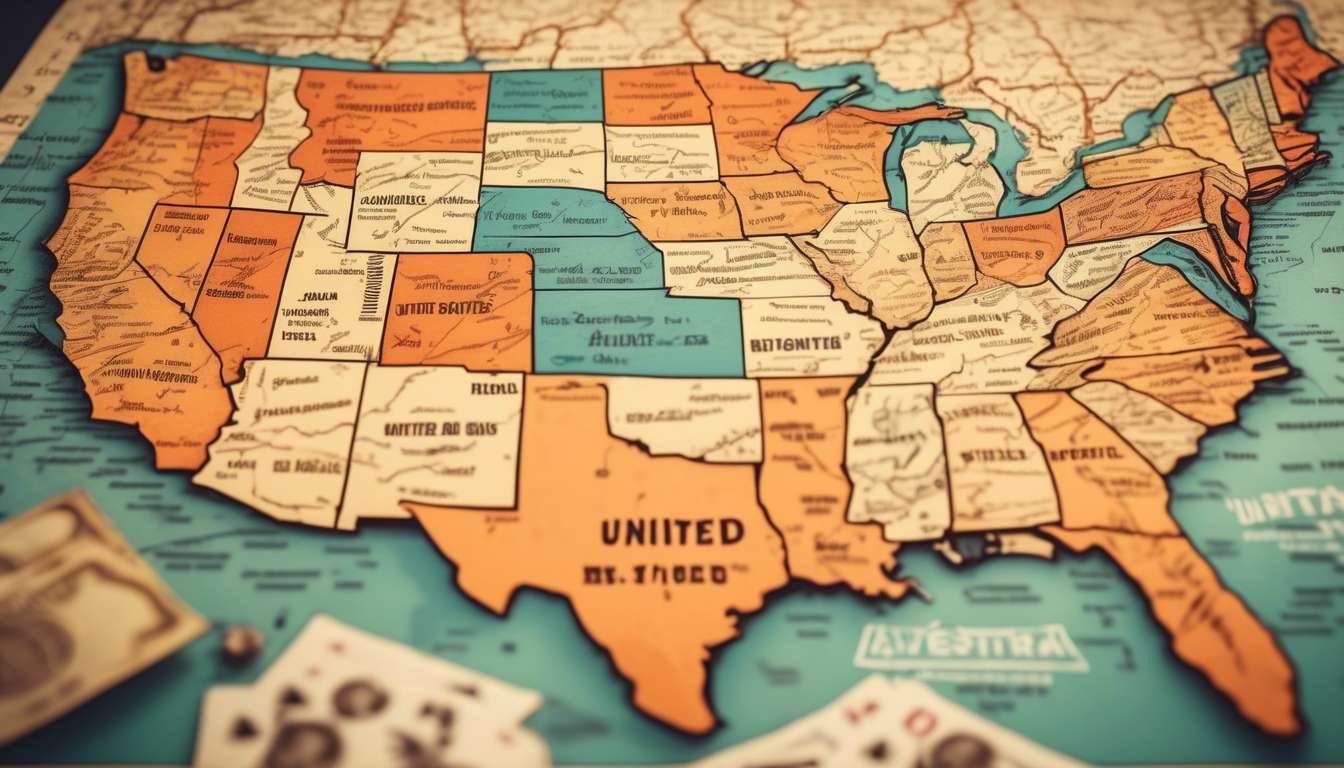As we journey back to 1975, we find ourselves in a world where sports betting was not the widespread phenomenon it is today.
Together, we explore the limited landscape of legal sports wagering in the United States during that era. At the time, only a select few states dared to navigate the complex legal and cultural challenges surrounding gambling.
Our investigation delves into:
- The motivations and legislative actions of these pioneering states
- How they set the stage for future developments in sports betting
We consider the social attitudes and legal frameworks that either encouraged or stifled the growth of this industry. By understanding the groundwork laid in 1975, we gain insights into the evolution of sports betting in the decades that followed.
Together, we embark on this historical journey, uncovering the origins of a pastime that would eventually captivate the nation and transform into the multi-billion-dollar industry we know today.
Early Adopters: Nevada’s Pioneering Role
In the mid-20th century, Nevada became a trailblazer in sports betting by legalizing and regulating the industry, setting the stage for others to follow. We embraced a vision that transformed our state into a hub of opportunity and excitement.
Nevada’s legislation on wagering was revolutionary, creating a framework where the thrill of the game met the security of regulation. This pivotal move turned sports betting into an integral part of our community, uniting us in shared passions and pursuits.
Together, we witnessed the evolution of an industry that welcomed both locals and visitors into its fold, offering a sense of belonging through shared experiences.
The legal framework established in Nevada didn’t just regulate; it invited us to be part of something bigger, a collective spirit of camaraderie and competition.
This pioneering role wasn’t just about laws and bets; it was about forging connections and building a community centered around the excitement of sports and responsible wagering.
New Jersey’s Bold Legislative Move
In a landmark decision, New Jersey challenged the status quo by passing legislation in 2018 that legalized sports betting, paving the way for significant changes across the nation.
This bold move not only put New Jersey on the map but also united us in a shared excitement for a modernized approach to wagering. For too long, Nevada held a monopoly on sports betting, but New Jersey’s determination offered us a fresh perspective and a chance to partake in the thrill and camaraderie that sports wagering brings.
We felt a sense of belonging in this new era, where our voices and desires shaped the future of sports betting. This legislation empowered us to explore opportunities beyond traditional boundaries, fostering a community that embraced innovation and progress.
New Jersey’s courage inspired other states to reconsider their stance on sports wagering, creating a ripple effect that forever changed the landscape of American sports betting.
Together, we’re part of this transformative journey.
The Unique Case of Delaware
Delaware stands out as a pioneer, becoming the first state to capitalize on the Supreme Court’s 2018 decision to allow sports betting beyond Nevada. We embraced the opportunity and swiftly enacted legislation to establish our presence in the wagering landscape. It was a bold move, reflecting our shared spirit of innovation and competitiveness.
By taking quick and decisive action, Delaware showed that we’re more than just a small state; we’re leaders in adapting to change. Our legislation not only set the stage for sports wagering but also created a community of enthusiasts who thrive on the excitement and camaraderie that betting brings. We didn’t just follow in the footsteps of Nevada; we carved our path and welcomed others to join us.
For us, sports betting isn’t just about the act of wagering. It’s about building connections and fostering a sense of belonging among fans and bettors alike, uniting us in our shared passion for sports and competition.
Oregon’s Limited Venture into Sports Betting
Unlike Delaware’s bold approach, Oregon took a more cautious path in reintroducing sports betting, focusing on limited options through state-operated platforms.
We remember how legislation in Nevada paved the way for legal wagering, but Oregon’s strategy was different. Our state decided to dip its toes into the betting waters rather than dive in headfirst, ensuring that we balanced both opportunity and caution.
By offering sports wagering through platforms like the Oregon Lottery, we aimed to:
- Create a sense of community and shared excitement.
- Avoid overwhelming our systems.
This approach allowed us to participate in the thrilling world of sports betting while maintaining a strong sense of control and responsibility. It was essential to feel connected to a broader movement yet stay true to Oregon’s values.
We found that this limited venture into sports betting fostered camaraderie among us, as we engaged in this new form of entertainment. Together, we navigated the complex landscape of sports wagering with enthusiasm and care.
The Growth of Montana’s Wagering Scene
Montana’s sports betting landscape has grown significantly as we embraced new opportunities and adapted to changing regulations. Unlike Nevada, where wagering was already a well-established tradition, Montana’s journey required us to navigate through fresh legislation and cultivate our own unique path.
As a community, we rallied together, driven by a shared vision to transform our state into a vibrant hub for sports enthusiasts. The passage of new legislation opened doors for local businesses, fostering a sense of belonging among us.
- We saw an opportunity not just to gamble, but to come together in shared excitement and camaraderie.
- Our local bars and taverns buzzed with energy as people gathered to place their bets, share their predictions, and experience the thrill of the game.
This collective enthusiasm turned sports betting into more than just a pastime; it became a tradition that united us. In Montana, wagering wasn’t just about the money—it was about being part of something bigger, a community bound by the thrill of the game.
The Surprising Entry of Washington, D.C.
In a surprising turn of events, Washington, D.C. joined the sports betting scene in 1975, challenging our expectations and reshaping the landscape. As a community eager to explore new opportunities, we found ourselves intrigued by D.C.’s bold move. This decision brought us closer, sharing the excitement of wagering like our counterparts in Nevada, the longstanding hub of sports betting.
The journey began with the introduction of innovative legislation that paved the way for legal betting. This legislation had a dual impact:
- It allowed us to place bets legally.
- It strengthened our connection to the broader sports community.
Our collective spirit thrived on this unity, knowing we were part of a transformative chapter in sports wagering.
We embraced this change, understanding that Washington, D.C.’s entry into the sports betting world was more than just a new venture—it was a chance to foster a sense of belonging. Together, we navigated the evolving scene, excited to witness what the future held.
Exploring the Landscape in Nevada
In the vast landscape of sports betting, Nevada’s rich history and pioneering role stand out prominently. Nevada has long been the epicenter of sports wagering due to its forward-thinking legislation that legalized betting in 1949. This trailblazing spirit set the stage for the modern sports betting world we know today.
Back in 1975, Nevada emerged as a beacon for passionate wagerers. The state offered a legitimate and regulated environment where enthusiasts could engage with their favorite sports. Nevada’s legislative foresight provided:
- A sense of community and belonging for bettors
- A space to celebrate shared interests and excitement
As we explore Nevada’s landscape, we’re reminded of the state’s commitment to innovation and its lasting impact on the sports betting industry. This sense of connection and pioneering spirit invites us to appreciate how far we’ve come and anticipate future possibilities.
Comparing Regulations and Impacts
In 1975, we witnessed a fascinating contrast in sports betting regulations and their impacts across different states.
Nevada stood out as the pioneer, embracing legislation that allowed regulated wagering. This move made Nevada a haven for those passionate about sports and betting, fostering a sense of community among enthusiasts. The state’s approach demonstrated how thoughtful legislation could create a thriving industry, benefiting both the economy and the people involved.
However, other states hesitated. They either imposed strict regulations or outright bans due to concerns about potential negative impacts. This divergence in approach created a patchwork of regulations across the country, leaving many yearning for a consistent framework.
We found ourselves drawn to Nevada’s model, not just for the betting opportunities, but for the sense of belonging it cultivated among its community. There, wagering wasn’t just about risk; it was about connection.
As we look back, it’s clear that Nevada’s regulations and their impacts were a beacon for future state legislation.
Conclusion
In conclusion, several states have embraced sports betting since 1975, with Nevada leading the way. Others like New Jersey, Delaware, Oregon, Montana, and Washington, D.C. have also joined the trend.
The landscape of sports wagering continues to evolve, with each state implementing its own regulations and experiencing unique impacts.
As more states consider legalizing sports betting, the industry is poised for further growth and innovation in the years to come.

